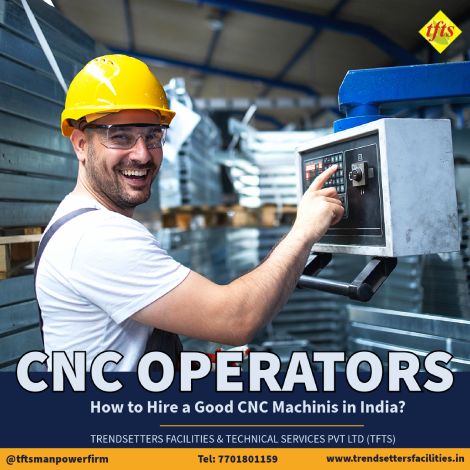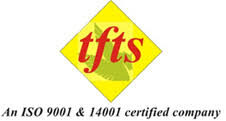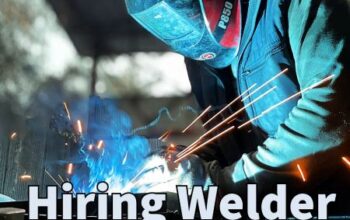
In the fast-paced landscape of the manufacturing industry, the CNC machining sector is gearing up for substantial growth, with a projected CAGR (Compound Annual Growth Rate) of 5% from 2022 to 2032. Thus, staying ahead of the curve is crucial, and one key aspect is ensuring you have the right CNC machinists on board. Let’s find out from Trendsetters Facilities and Technical Services, the leading ITI-certified CNC operator suppliers in Rudrapur, Pantngagar, Haridwar, SIDCUL, Bawal, Neemrana and Manesar, how to hire a CNC Machinist.
Who is a CNC Machinist?
A CNC machinist is a highly skilled professional responsible for the operation and maintenance of Computer Numerical Control (CNC) machines. These automated manufacturing tools utilize pre-programmed computer software to efficiently control and execute a diverse range of machining tasks like cutting, milling, drilling, and shaping various materials such as metal, plastic, or wood.

Different job roles of a CNC Machinist
The three basic CNC machinist job roles are:
CNC Operator: Entry-level position
Responsibilities:
- Load stock material
- Run the CNC machine
- No involvement in programming
Set-up Operator: Intermediate role
Responsibilities:
- Load and select programs
- Set up tools
- Test and ensure correct machine operation
- Fix errors during the process
CNC Machinist/Programmer: Advanced role
Responsibilities:
- Interpret blueprints
- Choose tools
- Determine speeds and feeds
- Write CNC programs in languages like G-code and M-code
1. Skills Required
When hiring a CNC machinist, it is crucial to evaluate a combination of technical expertise, practical experience, and interpersonal skills. Consider the following key attributes:
Technical Proficiency
CNC Programming: The ability to create, modify, and troubleshoot CNC programs.
Machine Operation: Proficient in setting up, operating, and adjusting CNC lathe or mill machines.
Blueprint Reading: Capability to interpret and comprehend blueprints for precise machining processes.
Machinery Knowledge
Material Knowledge: Understanding the characteristics of different materials.
Tooling Selection: Choosing appropriate cutting tools for various machining tasks.
Precision Measurement: Accurate use of calipers, micrometers, gauges, etc.
Problem-Solving Skills: Aptitude for solving practical problems and addressing various situations that require sound reasoning. Ability to understand and execute instructions given in written, verbal, diagram, or schedule formats.
Troubleshooting
Capability to identify and resolve issues with CNC machines.
Adaptability: Ability to adjust to unforeseen changes or challenges during the machining process.
Attention to Detail
Consistent production of accurate and high-quality machined parts.
Commitment to maintaining quality standards and conducting inspections.
Computer Skills
Proficiency in CAD/CAM software for computer-aided design and manufacturing.
Comfortable using computers and software for data entry, monitoring, and analysis.
Safety Awareness
Understanding and adherence to OSHA safety protocols and regulations.
Knowledge of proper safety procedures when operating CNC machines.
Communication Skills:
Effective collaboration with team members, engineers, and supervisors.
Clear communication of progress, issues, and completed tasks.
Time Management
Efficient time management to meet production deadlines.
Prioritization of tasks based on urgency and importance.
Continuous Learning
Willingness to adapt and learn new CNC technologies and advancements in the field.
Experience and Education:
Previous experience in CNC machining roles.
Formal education or training in machining, CNC programming, or related fields. A CNC qualification from a college or technical school is beneficial, coupled with two or three years of on-the-job experience.
Ensure a comprehensive assessment of both technical skills and overall work ethic, attitude, and interpersonal skills to secure a well-rounded fit for your team and organization.
2. A Detailed Job Description
Crafting an effective job description for a CNC machinist is crucial for attracting top talent. Clearly outline the role, responsibilities, and required skills, emphasizing your workplace culture and exciting projects. Highlight technical skills like CNC machine operation, blueprint reading, and tooling expertise.
Specify the minimum experience level or equivalent training required and any preferred education or certifications related to CNC machining. Outline physical requirements, such as standing for extended periods and lifting heavy objects. Identify desired soft skills like teamwork, communication, and problem-solving abilities.
Describe the work environment, including exposure to noise, heat, or hazardous materials. Emphasize the importance of safety protocols. Showcase growth opportunities and career advancement within the company. Clearly state how applicants should submit their resumes and any required documents.
Precision is key in crafting these requirements to attract the best CNC machinist candidates. Make sure your job description stands out and sparks interest in shaping a bright future together.
3. Practical Assessments
Resumes and interviews offer a glimpse into a candidate’s educational and professional background, yet they fall short of revealing the depth of practical skills and dynamic problem-solving capabilities. To address this gap, various CNC skills tests are taken to assess their expertise and knowledge in the concerned field. These assessments aim to comprehensively evaluate a candidate’s proficiency, considering that expertise in machining is acquired through hands-on experience and time spent in the field.
By doing so, employers ensure that candidates not only possess the requisite knowledge but also exhibit the problem-solving and machining skills crucial for efficient part manufacturing. Implementing hands-on testing directly on the shop floor is a crucial step in assessing a candidate’s machining skills. These practical assessments may involve tasks such as programming CNC machines, setting up tools, and troubleshooting common issues.
4. Use Digital Medium
Advertise your CNC Machinist job on targeted aviation and engineering job boards. Utilize online platforms, CNC associations, and forums for precision targeting. Collaborate with educational institutions and industry events to identify emerging talent. Build a robust talent pool for a steady supply of skilled CNC machinists to meet growing demands in the aviation industry.
These are just a few insights from Trendsetters Facilities and Technical Services on hiring a CNC Machinist in India. With a focus on technical proficiency, problem-solving skills, and a commitment to safety, finding the right candidate involves a comprehensive approach encompassing skills assessment, detailed job descriptions, and strategic digital recruitment. Secure your team’s success with a well-rounded CNC Machinist who brings expertise and adaptability to your organization.



